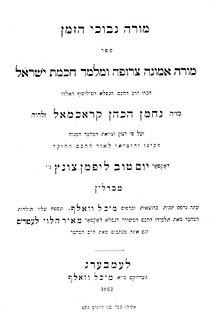After some time
Nachman Kohen Krohaben (born February 17, 1785 in Brody , Galicia , † July 31, 1840 in Ternopol ) was a Jewish religious philosopher , historian and author . His main work More Nebukhe ha-Zeman , which he initially called the gates of the purified faith , was published posthumously by Leopold Zunz in 1851 under the title Leader of the Confused of this Time , as an allusion to the book Leader of the Confused by Maimonides . It is an attempt at a contemporary philosophy of religion and history based on post-Kantian idealism (especially Schelling, Hegel).
Life
In his youth, he acquired a broad education and, in addition to Torah and Talmud, also learned Jewish philosophy , read the letters of Maimonides and Abraham ibn Esra and learned various foreign languages. With the help of his knowledge of German, he studied the works of Kant , Hegel , Fichte and Schelling . In addition, he learned Latin , French , Arabic and Syriac . His students later confirmed his extensive education. At the age of 14, Kromal married and moved to Zolkiew to live with his wealthy father-in-law . In 1814 he began to gather a circle of students around himself, talked to them about philosophy, history and Jewish literature and thus became one of the most important representatives of the Haskala in Poland. After the death of his father-in-law, he began working as a trader. After returning to Brody for two years in 1836, he spent the last two years of his life in Ternopil. He turned down the proposal to take up a position as a rabbi in Berlin and instead dealt with the writing of his book, which he could no longer complete.
Fonts (selection)

- Leader of the Confused of Time. Translated, with an introduction and registers, edited by Andreas Lehnardt. 2 volumes. Meiner, Hamburg 2012, ISBN 978-3-7873-2138-4 , ISBN 978-3-7873-2139-1 .
literature
Monographs:
- Judah Loeb Landau : After a while. A Hegelian . S. Calvary & Comp., Berlin 1904.
- Jay M. Harris: Nachman Krohaben: Guiding the Perplexed of the Modern Age (Modern Jewish Masters Series) (Paperback), New York University Press, Reprint 1993, ISBN 0-8147-3508-8
Articles and essays:
- Daniel Kroglichnik : R. Nachman Krohaben (called RaNaK) (1785–1840). In: Andreas B. Kilcher, Otfried Fraisse (ed.): Metzler Lexicon of Jewish Philosophers. Philosophical thinking of Judaism from antiquity to the present. Stuttgart 2003, ISBN 3-476-01707-9 , pp. 210-214.
- Andreas Lehnardt: Rabbi Nachman Kroglich. A biography between tradition and enlightenment. In: Folker Siegert (Ed.): Grenzzüge. Biographies on the border between Judaism and Christianity, Christianity and Judaism. Münster 2002, pp. 140–151.
- Andreas Lehnardt: The development of Halakha in Nachman Krochmal's philosophy of history. In: Frankfurt Judaic Contributions. Vol. 29 (2002), pp. 105-126.
- Andreas Lehnardt: Maimonides and Nachman Krochmal's philosophy of history. In: G. Hasselhof; O. Fraisse (ed.): Moses Maimonides (1138–1204): His Religious, Scientifical, and Philosophical History of Effects in Different Cultural Contexts. Würzburg 2004, pp. 427-448.
- Andreas Lehnardt: Kroglich, Nachman. In: Biographisch-Bibliographisches Kirchenlexikon (BBKL). Volume 28, Bautz, Nordhausen 2007, ISBN 978-3-88309-413-7 , Sp. 941-952.
- Margarete Schlueter : Jewish conceptions of history of the modern age. The designs by Nachman Krohaben and Heinrich Graetz. In: Frankfurt Judaic Contributions. 18: 175-205 (1990).
- Margarete Schlüter: “Jewish Spirituality in Poland” - On the reception of earlier constructions of rabbinical tradition in Nachman Krochmal's presentation of the development of the Oral Torah. In: Frankfurt Judaic Contributions. Vol. 28 (2001), pp. 103-119.
- Heinz Schöny: Nachman Krohaben . In: Austrian Biographical Lexicon 1815–1950 (ÖBL). Volume 4, Verlag der Österreichischen Akademie der Wissenschaften, Vienna 1969, p. 286.
- Constantin von Wurzbach : Kroglich, Nachman Kohen . In: Biographisches Lexikon des Kaiserthums Oesterreich . 13th part. Kaiserlich-Königliche Hof- und Staatsdruckerei, Vienna 1865, pp. 239–242 ( digitized version ).
Web links
- Literature by and about Nachman Kromal in the catalog of the German National Library
| personal data | |
|---|---|
| SURNAME | All right, Nachman |
| ALTERNATIVE NAMES | Kroglich, Nachman Kohen |
| BRIEF DESCRIPTION | Jewish scholar, historian and author |
| DATE OF BIRTH | February 17, 1785 |
| PLACE OF BIRTH | Brody , Galicia |
| DATE OF DEATH | July 31, 1840 |
| Place of death | Ternopil |